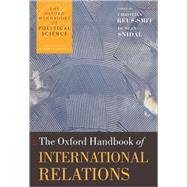
| Introduction | |
| Christian Reus-Smit and Duncan Snidal: Between utopia and reality: the practical discourses of international relations | |
| Imagining the discipline | |
| The state and international relations | |
| From international relations to global society | |
| The point is not just to explain the world but to change it | |
| A disabling discipline? | |
| Major theoretical perspectives | |
| Eclectic theorizing in the study and practice of international relations | |
| Realism | |
| The ethics of realism | |
| Marxism | |
| The ethics of Marxism | |
| Neoliberal institutionalism | |
| The ethics of neoliberal institutionalism | |
| The new liberalism | |
| The ethics of the new liberalism | |
| The English School | |
| The ethics of the English School | |
| Constructivism | |
| The ethics of constructivism | |
| Critical theory | |
| The ethics of critical theory | |
| Postmodernism | |
| The ethics of postmodernism | |
| Feminism | |
| The ethics of feminism | |
| The question of method | |
| Methodological individualism and rational choice | |
| Sociological approaches | |
| Psychological approaches | |
| Pevehouse: Quantitative approaches | |
| Case study methods | |
| Historical methods | |
| Bridging the subfield boundaries | |
| International political economy | |
| Strategic studies | |
| Foreign policy decision-making | |
| International ethics | |
| International law | |
| The scholar and the policy-maker | |
| Scholarship and policy-making: who speaks truth to whom? | |
| International relations: the relevance of theory to practice | |
| The question of diversity | |
| International relations from below | |
| International relations theory from a former hegemon | |
| Old and new | |
| The concept of power and the (un)discipline of international relations | |
| Locating responsibility: the problem of moral agency in international relations | |
| Big questions in the study of world politics | |
| The failure of static and the need for dynamic approaches to international relations | |
| Six wishes for a more relevant discipline of international relations | |
| Table of Contents provided by Publisher. All Rights Reserved. |
The New copy of this book will include any supplemental materials advertised. Please check the title of the book to determine if it should include any access cards, study guides, lab manuals, CDs, etc.
The Used, Rental and eBook copies of this book are not guaranteed to include any supplemental materials. Typically, only the book itself is included. This is true even if the title states it includes any access cards, study guides, lab manuals, CDs, etc.